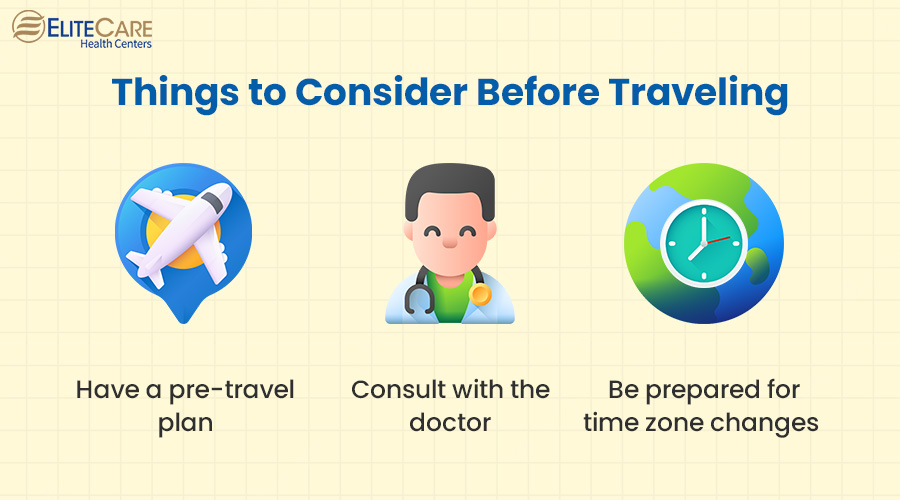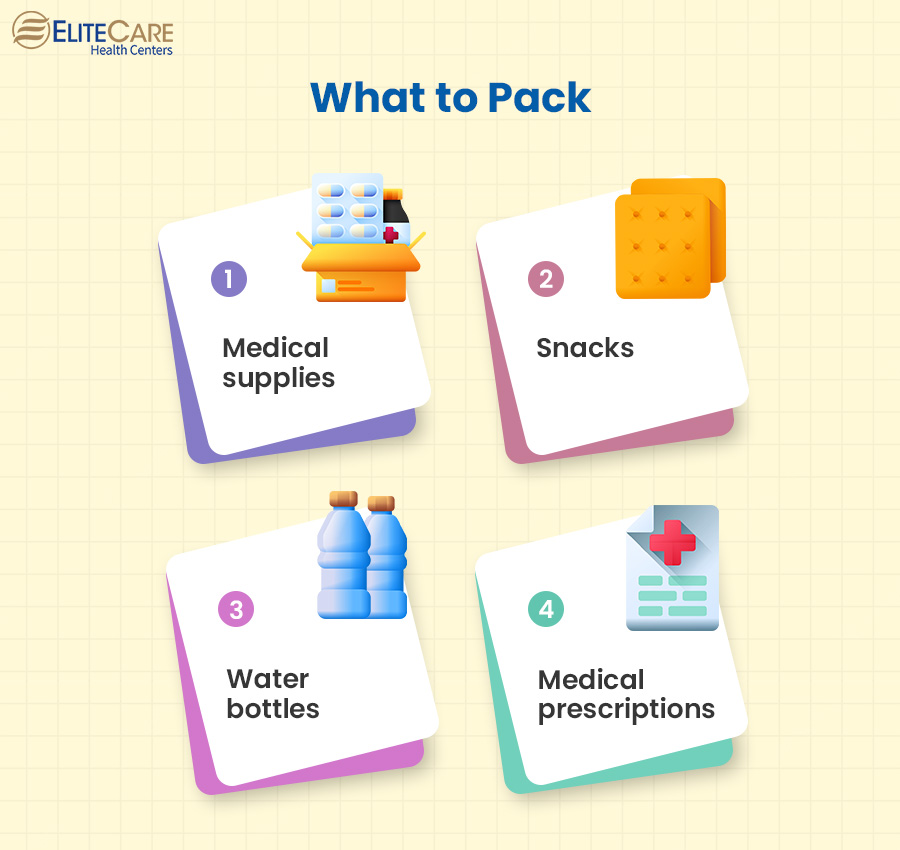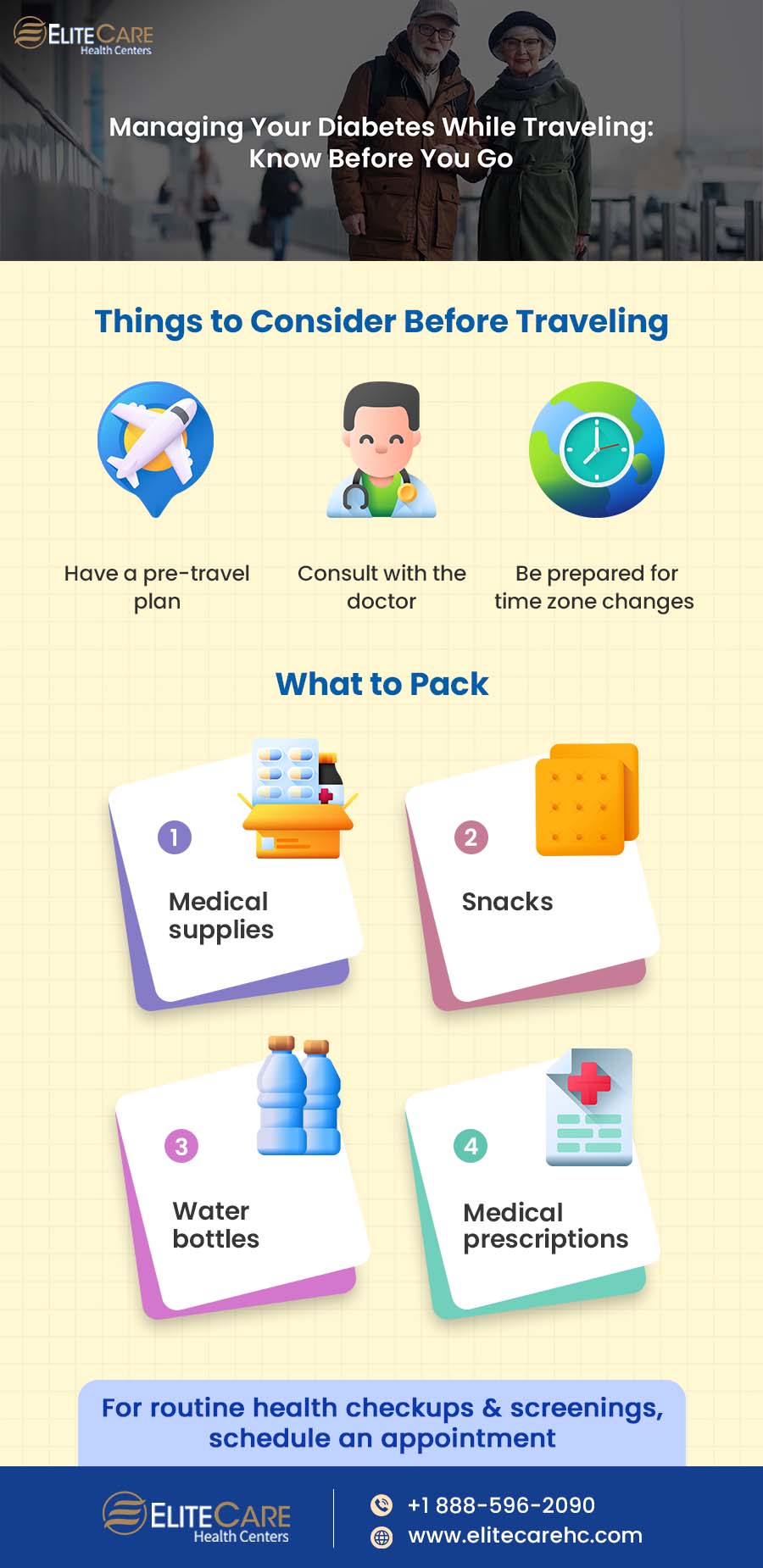
Travelling has now become a part of our day-to-day lives, but it can also be a challenge for people with certain health conditions, such as diabetes. Managing blood sugar levels, bringing the necessary supplies, finding suitable meals, and getting access to medical care can be challenging for people with diabetes. But not to worry! With proper preparation and planning, traveling with diabetes can be an enjoyable and stress-free experience.
In this blog post, we will look at all the aspects of traveling with diabetes, focusing on how to travel with diabetes and the importance of being prepared before proceeding on a journey.
Things to Consider Before Traveling

Whether it’s a plan for a short trip or a long journey, it is important to know the ways to manage diabetic conditions effectively. By adopting these guidelines, one can maintain their health while traveling and prevent any unwanted complications.
Have pre-travel plan
This includes having a thorough understanding of the destination and mode of transportation that will be used. It also includes details related to local foods and healthcare services. This information can assist one in preparing for any medical emergency such as Hypoglycemia, Diabetic ketoacidosis, foot problems, etc. that may emerge anytime during the trip.
Researching the availability of medical supplies and insulin at the location is crucial for diabetic patients traveling overseas. Here are some important things one can consider when researching medical supplies and insulin availability are:
Local regulations: Because buying medical supplies or insulin may call for a prescription or other paperwork in some nations.
Availability: It is advisable to get insights into the availability of medicines a patient might need and research local pharmacies near the area one is going to stay.
Consult with the doctor
Before beginning the trip, it is important to consult an endocrinologist or primary care physician. A doctor can advise on how to keep blood sugar levels stable while traveling. In some cases, they may also adjust the dosages of insulin and prescribed medications. For instance, the doctor may advise reducing the insulin dosage if the patient travels at a high altitude or during the winter.
Additionally, they can share a medical prescription for any necessary medications and a travel note outlining the patient’s medical requirements.
Prepare for changes in time zones
If the patient is traveling across time zones, they must adjust their medication and insulin schedules accordingly. Also, the doctor can advise them on how to alter their dosage to adjust for time zone differences.
Traveling with diabetes requires monitoring time-sensitive routines such as mealtimes and medication schedules. Setting a device, such as a smart phone or smart watch, to both the home and destination times is one of the easiest ways to make sure one keeps on track with their medication schedules and overall treatment.
What to Pack

Medications and supplies
Pack enough insulin, test strips, syringes, lancets, and any other medicines or supplies prescribed by the doctor to manage diabetes. These extra medicines might help in case of emergency or unexpected delays. These supplies must be kept in the carry-on luggage to ensure that they are easily accessible.
Suitable snacks
It’s important to keep suitable snacks within reach throughout the journey. You can pack healthy snacks such as fresh fruit, nuts, and protein bars. These snacks serve to maintain stable blood sugar levels and aid in the use of medications such as insulin, which can cause hypoglycemia (low blood sugar) if given without proper food intake.
Medical documentation
Patients must pack their medical papers, including medical ID cards, travel letters, and health insurance cards. These documents are important in the event of an emergency or if one needs to get medical attention while traveling or during layovers.
Identity proof
When traveling with diabetes, it’s important to be prepared for any situation that may arise, including medical emergencies or the need to refill medications. So, one must also pack a form of identification, such as a driver’s license or passport.
Another important aspect of being prepared for emergencies while traveling with diabetes is to have an ICE (In Case of Emergency) contact listed on one’s phone. The ICE contact should be easily available so that patients or attendants can immediately notify emergency contacts if needed.
Water bottle
Staying hydrated is essential for diabetes management since it helps to maintain blood sugar levels and promotes digestion. It’s particularly important when a person is on long flights, as dehydration can be accelerated due to the dry cabin atmosphere.
Hence, carrying a refillable water bottle is essential. This will help ensure that patients with diabetes have access to clean water, as they must drink at least eight 8-ounce glasses of water each day or according to the climatic condition of the place.
Things to Consider While Traveling
Keep a frequent check on your sugar level
Changes in diet, degree of exercise, and time zone can all have an impact on blood sugar levels. As a result, it is essential to maintain track of it frequently and to seek an update from the physician on any necessary changes to insulin dosage. Also, patients must ensure that they have a reliable blood glucose meter, test strips, and other necessary supplies.
Be mindful of food choices
A well-balanced and healthy diet is essential for diabetes management. It might be tempting to try new cuisines and sweets while traveling. However, it is important to be mindful of food choices and stick to healthy, balanced meals that will help regulate blood sugar levels.
When trying any new packaged food, please read food labels to ensure the food is low in sugar, carbs, and saturated fats. Also be mindful of food ingredients and cooking procedure used to ascertain if it is good for a person to eat.
Communicate with co-passengers regarding the health issues
If the patient is traveling in a group, it is good for them to communicate about their health issues and any special needs they may have. This ensures that their companions are aware of their situation and can assist them in emergency cases. It is also suggested to wear a medical alert bracelet or necklace to identify oneself as a diabetic in case of an emergency.
Keep oneself active on a long journey
Long durations of sitting can raise the risk of blood clots and other health concerns such as the increase in blood sugar levels and decreased insulin sensitivity, making it difficult to manage diabetes. Hence, patients need to get up and walk about regularly, even if it is just to stretch their legs. They can also try exercises that can be done while sitting, such as ankle rotations and calf raises.
How to Deal with Emergencies
Being prepared for emergencies is crucial when traveling with diabetes. One of the first things one should do is look for the local emergency services in the location they’ll be visiting. This includes identifying nearby hospitals, urgent care facilities, and pharmacies. One should also have the medical emergency, ambulance phone number saved in their phone, so they can quickly call for help if needed.
Furthermore, patients traveling abroad must also have medical insurance. This can provide coverage for medical emergencies, including COVID-19, hospitalization and emergency medical repatriation.
Conclusion
Traveling with diabetes can be challenging, but by taking proper measures, one can ensure a safe journey and an enjoyable trip. It is essential to consult one’s physician when making any travel plans and get proper advice and medical prescription.
In case you still have queries, contact the best medical clinic EliteCare Health Centers, one of the leading medical clinics in Florida offering a wide range of senior care services. Schedule an appointment with a board-certified physician by visiting our website or contacting the nearest health care center






